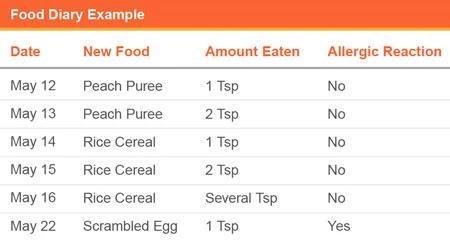Due to maintenance, rewards points for receipt uploads will be delayed. Thank you for your patience!

Introducing your little one to a variety of tastes and textures through solid foods should be fun. But when your baby is allergic to cow’s milk, this milestone can be stressful.
You know that dairy is found in many childhood favorites like yogurt and cheese. But other products like bread, cereal and crackers also can contain casein, whey or other hidden dairy ingredients. Cow’s milk is even in some commercial baby foods. For these reasons, it is important to consult with your pediatrician or a dietitian before making any changes to your baby’s diet.
Because babies with cow’s milk allergy can’t have dairy products, there is a risk that they may miss out on key nutrients like fat, protein, calcium, and vitamin D when they start eating dairy-free foods. Nutramigen® with Enflora™ LGG®* and PurAmino™ contain important nutrients for growing babies who have cow’s milk allergy. This is why it’s important to continue feeding your baby Nutramigen or PurAmino formula for as long as your doctor recommends.
Both Nutramigen with Enflora LGG and PurAmino are nutritionally complete. Nutramigen with Enflora LGG is designed to serve as a sole source of nutrition for infants up to six months and as a ma/products/puramino-formula/powder-can-14-1-oz-can/jor source of nutrition through 12 months. Babies who are doing well on PurAmino don’t need to change formulas as they grow because this amino acid-based formula is appropriate as the sole source of nutrition for infants up to six months and as a major source of nutrition through age two.
Your baby will be ready to try solid foods when she is between four and six months old. Look for these cues:
Watching your baby’s facial expressions as she samples new foods is sure to bring smiles to you both. You should savor this fun milestone while also taking some precautions. First, consult with your doctor before making any changes to your infant’s diet. Because infants who have cow’s milk allergy or who have a family history of food allergies have a greater chance of also being allergic to soy, eggs, wheat, peanuts, tree nuts, and fish, you may need to take particular care when introducing these foods. Your doctor can advise you on how and when to introduce potentially allergy-inducing foods, as well as educate you about what steps to take if your baby has an allergic reaction, such as breathing difficulties, vomiting or hives.
Follow these steps when introducing solid foods to your baby with cow’s milk allergy.

The eight-month mark is a good time for your baby to begin to learn to drink breast milk or Nutramigen or PurAmino formula from a cup. A spill-proof cup with a lid and spout can make this transition easier for your baby while creating fewer messes for you to clean up. Start by offering your baby a cup of water once a day until she learns how to work with the cup. Then, offer breast milk or Nutramigen formula in the cup in the morning after she has eaten cereal or other foods. If your baby refuses the cup, try serving breast milk or Nutramigen formula cold in the cup. Keep offering the cup every day.
Once your baby accepts the morning cup, gradually swap out her afternoon and evening bottles. Your little one will be less likely to ask for a bottle if you keep them out of her sight. Don’t wait too long to make this transition: Breaking the bottle habit can be hard. By two years, your baby should be drinking formula from cup, not from a bottle. You should continue to feed your baby Nutramigen or PurAmino formula in a cup for as long as your doctor recommends. Don’t introduce your baby to cow’s milk unless you are under the supervision of a healthcare professional.
*LGG is a registered trademark of Chr. Hansen A/S.
References
All information on Enfamil, including but not limited to information about health, medical conditions, and nutrition, is intended for your general knowledge and is not a substitute for a healthcare professional's medical identification, advice, or management for specific medical conditions. You should seek medical care and consult your doctor or pediatrician for any specific health or nutrition issues. Never disregard professional medical advice or delay seeking medical treatment, care, or help because of information you have read on Enfamil.